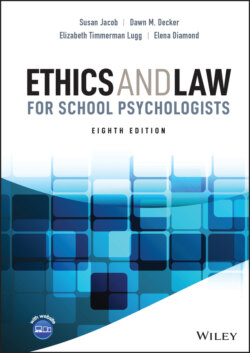Читать книгу Ethics and Law for School Psychologists - Susan Jacob - Страница 51
Ethics Committees and Sanctions
ОглавлениеThe APA (2018) publishes an extensive set of rules and procedures for investigation and adjudication of ethical complaints against APA members. According to APA’s Rules and Procedures, the primary objectives of its ethics committee are to “maintain ethical conduct by psychologists at the highest professional level, to educate psychologists concerning ethical standards, [and] to endeavor to protect the public against harmful conduct by psychologists” (Part A). The ethics committee investigates complaints alleging violation of the ethics code by APA members. Possible sanctions for ethics violations include reprimand, censure, expulsion, stipulated resignation, and probation (Part B).
The purposes of the NASP’s Ethical and Professional Practices Board (EPPB) are: (a) to promote and maintain ethical conduct by school psychologists, (b) to enforce the NASP Principles, (c) to investigate legitimate complaints as determined by the EPPB, (d) to determine violations of the Principles and sanctions based on the results of its investigations, (e) to educate school psychologists regarding NASP ethical standards, and (f) to protect the general well-being of consumers of school psychological services (2018, Section I.A.2). The EPPB responds to questions regarding appropriate professional practices and is committed to resolving concerns informally, if possible. The Board investigates alleged ethical misconduct of NASP members or any psychologist who holds an NCSP credential (p. 1). If, after investigation, the EPPB determines that a violation of NASP’s Principles for Professional Ethics has occurred, the EPPB may require the respondent to engage in remedial activities such as education or training. The EPPB also may recommend probation, suspension, or termination of NASP membership, and/or revocation of the NCSP certification (NASP, 2018).
The legality of ethical complaint adjudication was tested in court in the case of Marshall v. American Psychological Association (1987). The plaintiff in this case claimed that the APA had no legal right to expel him or to publicize his expulsion from the association following an investigation of ethical misconduct. The court upheld the authority of the APA to expel the plaintiff, noting that he agreed to be bound by the APA’s ethical principles when he joined the association, that the principles were repeatedly published, and that he had detailed hearing rights to respond to any and all charges.
